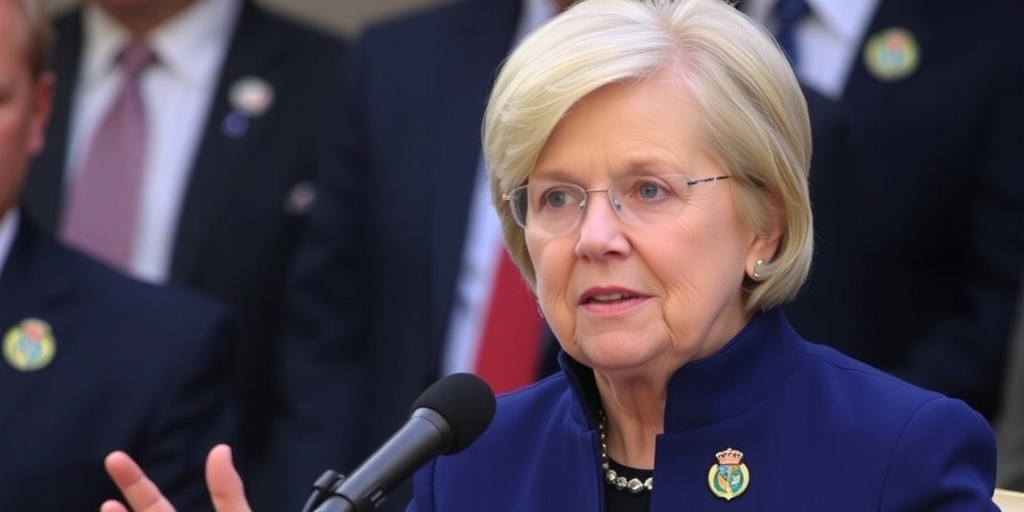Now Reading: Janet Mills: Maine Governor Who Told Trump, ‘See You in Court’
-
01
Janet Mills: Maine Governor Who Told Trump, ‘See You in Court’
Janet Mills: Maine Governor Who Told Trump, ‘See You in Court’

Maine Governor Janet Mills Stands Firm Against Trump on Transgender Athlete Ban
In a highly publicized standoff following a White House meeting, Janet Mills, the Democratic governor of Maine, emerged as a pivotal figure in the ongoing political discourse regarding transgender athletes in sports. Mills’s firm refusal to comply with President Donald Trump’s executive order, which sought to ban transgender athletes from participating in women’s sports, has made her a symbol of resistance for many in her party—a move that has also drawn the ire of federal authorities.
During a meeting with a group of bipartisan governors at the White House, Mills confronted Trump directly, stating unequivocally, “I would not accede to your executive order.” Her bold declaration, “See you in court,” underscored her commitment to not back down against federal pressure. In response, the U.S. Department of Education swiftly notified Maine officials that their education department was under a "directed investigation."
Craig Trainor, acting head of the Department of Education’s civil rights division, warned that if Maine did not comply with the order, it could face significant financial repercussions, stating, “The Trump administration will do everything in its power to ensure taxpayers are not funding blatant civil rights violators.” Despite this threat, Mills remained undeterred. “Do not be misled: This is not just about who can compete on the athletic field; this is about whether a president can force compliance with his will, without regard for the rule of law,” she declared in a statement addressing the escalating situation.
Throughout her political career, Mills has been a prominent figure in Maine politics, known for her defense of civil rights and opposition to controversial policies during the previous Trump administration, particularly regarding immigration and reproductive rights. It was her stance against the administration’s hard-line policies that propelled her to become Maine’s first female governor.
Born in Farmington, Maine, Mills hails from a politically active family. Her father, Sumner Peter Mills Jr., was a Republican state legislator and U.S. attorney under the Eisenhower and Nixon administrations. After earning degrees from the University of Massachusetts and the University of Maine School of Law, Mills made history by becoming Maine’s first female criminal prosecutor in the attorney general’s office. In 1978, she emphasized her passion for justice in an interview, where she stated, “I like prosecuting murder trials the best.”
Mills subsequently broke more barriers by becoming the first female district attorney in New England and in 2009, Maine’s first female attorney general. Throughout her tenure, she made notable strides in advocating for victims of domestic violence, countering legislative vetoes regarding opioid overdose treatment, and resisting attempts to bolster anti-immigrant policies endorsed by her predecessor, Paul LePage, a conservative aligned with Trump.
After LePage’s term ended, Mills was elected as governor in 2019, bringing with her a focus on economic growth and expanding health care coverage. Notably, she has pushed for laws to prevent discrimination against transgender individuals within health insurance policies and has supported access to gender-affirming care for those aged 16 and older. While she has not introduced specific legislation concerning transgender athletes, it is important to note that the governance of high school sports in Maine is not under the governor’s purview but rather falls to the Maine Principals’ Association, an independent organization.
Trump’s awareness of Mills has been questionable at times, as evidenced by a misidentification during a campaign call in late 2024, wherein he mistakenly referred to her as a man and erroneously claimed she intended to bring 75,000 immigrants to Maine. Despite leaning more conservative in recent voting patterns, Mills has maintained a balanced response to Trump’s administration, emphasizing her intent to support policies beneficial to Maine while opposing those detrimental to her constituents.
In light of the conflict following her direct challenge to Trump’s order, Mills has expressed concerns about the implications of such federal investigations, suggesting that her state may not be the last to face scrutiny for standing up against unconstitutional mandates. “You must ask yourself: Who and what will he target next, and what will he do?” she questioned, raising the alarm over potential future actions against marginalized groups based on race, religion, or ideology.
As the tension continues to unfold, Mills’s refusal to capitulate not only cements her role as a formidable political figure but also ignites a broader conversation regarding civil liberties and state sovereignty in the face of federal authority. Her resolve exemplifies a growing movement among state leaders to challenge executive overreach, ensuring that the principles of democracy and the rule of law are upheld for all citizens.
Stay Informed With the Latest & Most Important News
Previous Post
Next Post
-
 01New technology breakthrough has everyone talking right now
01New technology breakthrough has everyone talking right now -
 02Unbelievable life hack everyone needs to try today
02Unbelievable life hack everyone needs to try today -
 03Fascinating discovery found buried deep beneath the ocean
03Fascinating discovery found buried deep beneath the ocean -
 04Man invents genius device that solves everyday problems
04Man invents genius device that solves everyday problems -
 05Shocking discovery that changes what we know forever
05Shocking discovery that changes what we know forever -
 06Internet goes wild over celebrity’s unexpected fashion choice
06Internet goes wild over celebrity’s unexpected fashion choice -
 07Rare animal sighting stuns scientists and wildlife lovers
07Rare animal sighting stuns scientists and wildlife lovers





















